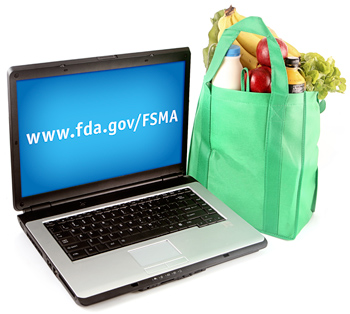For Consumers
Redesigned FDA Web Page Fosters Food-Safety Awareness
|
Stay Up to Date! |
 |
 Get Consumer Updates by E-mail
Get Consumer Updates by E-mail
 Share copies of this article (811 KB)
Share copies of this article (811 KB)
More on the Food Safety Modernization Act
Remember the iconic “Uncle Sam Wants You” poster? Well, the Food and Drug Administration (FDA) wants “you” for its food safety efforts.
“You” are all the stakeholders in food safety: consumers, industry, food safety professionals, local and state regulators, and international trading partners.
To make it easier for you to know what FDA is doing and to become involved through public hearings, the agency has redesigned its web page dedicated to the FDA Food Safety Modernization Act (FSMA): www.fda.gov/FSMA.
In addition, FDA delivered the first tangible product of the historic food safety reform legislation on April 4: a new web-based recall search engine that makes it easier and quicker to learn about product recalls.
“Recalls, mandatory or otherwise, are serious and we must do everything possible to make it easier for people to know about these recalls so they can take all appropriate steps to protect themselves and their families,” says Michael R. Taylor, FDA’s deputy commissioner for foods
Taylor also underlined the importance of the new web page in implementing the food safety law.
“We know that success depends heavily on bringing our stakeholders into the effort. We are working hard to keep them informed and to get their input throughout the process,” he says.
Taylor and other FDA officials will keep looking for ways to involve all stakeholders in the implementation of the landmark food safety law.
Key elements of the new FSMA web page include:
- More than 50 “frequently asked questions” addressing concerns FDA staff have heard at public meetings since the law’s enactment, such as implementation deadlines, expected new responsibilities for industry, and new fees. The questions are organized in broad subject areas, including produce safety, food imports, prevention, and scope.
- Three short videos in which FDA food safety experts explain how the agency is developing provisions covering imports, inspections and compliance, and preventive standards to minimize the risk of potential hazards.
- A graphic presentation of the implementation teams, by area of focus, that are doing the hard work of implementing the provisions of the new law.
- A section on outreach with links to agendas and transcripts of the meetings FDA is holding to solicit data and ideas. The first meeting, which addressed imports, was held March 29 and attracted more than 500 people. The next public meeting, April 20 at the agency’s White Oak campus in Silver Spring, MD, will focus on preventive controls. Those who want to attend can sign up via a link on the web site.
The development of the new recall search engine is a good example of that outreach. FDA staff shared a draft approach with consumer and industry groups and solicited their ideas on how to make it better. The feedback resulted in a number of modifications before the search engine “went live” on April 4, the new law’s deadline.
Recall information is now presented in an easy-to-read table organized by date, product brand name, product description, reason for recall, recall press release, the recalling firm and, where possible, a photograph of the product. This is dramatically different from the old format, which provided a scroll-down list of links in response to a search for information on a specific recall.
The recalls table can also be reached through FDA.gov and FoodSafety.gov. Mobile applications can be downloaded by going to Recalls.gov.
Consumer groups – such as Safe Tables Our Priority (STOP) – and industry representatives – such as Grocery Manufacturers Association – hailed the recall search engine improvements made by FDA and its consultative approach.
Education and Outreach to the Farming Community
An example of the coalition approach to implementation is the Produce Safety Alliance, a recent collaboration between Cornell University, the U.S. Department of Agriculture and FDA. The alliance, which is featured on the FSMA web page, is looking for people with knowledge about produce safety to help draft a training curriculum to promote the best practices for on-farm food safety.
James R. Gorny, FDA’s senior advisor for produce safety, explains that in anticipation of an upcoming proposed agency regulation, the alliance training will guide farmers on how to safely grow, harvest and handle fresh fruits and vegetables. "We're trying to especially give small and very small farmers and packers the knowledge they need," he says.
Those interested in the Alliance's work can sign up at its site for e-mail updates.
This article appears on FDA's Consumer Updates page, which features the latest on all FDA-regulated products.








